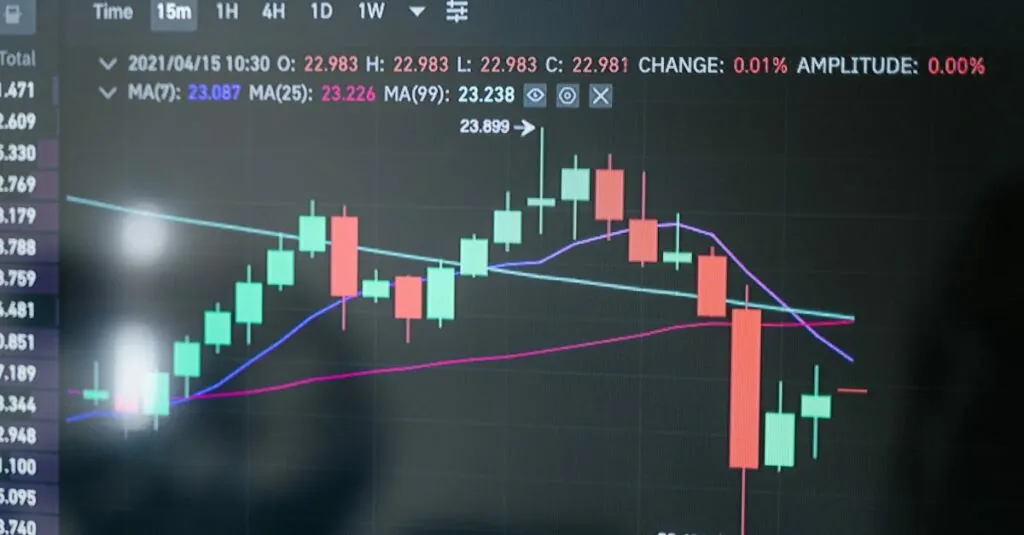Table of Contents
ToggleWhen the stock market takes a nosedive, it feels a bit like watching a cat chase a laser pointer—exciting yet utterly bewildering. Investors are left scratching their heads, wondering what went wrong. Was it an unexpected economic report? A sudden geopolitical crisis? Or did someone spill coffee on the trading floor?
Understanding the Stock Market
The stock market functions as a complex system where securities are bought and sold. Prices fluctuate based on supply and demand, influenced by various factors. Economic indicators can significantly impact investor sentiment, causing shares to rise or fall rapidly.
Investors react to unexpected economic reports, which can create waves of uncertainty. Geopolitical crises also play a crucial role in market behavior. Decisions made by central banks affect interest rates, impacting investor confidence.
Market psychology drives trading activities. Fear often leads to panic selling, while optimism can encourage buying. Sentiment triggers both emotional and rational responses among investors.
Trivial incidents on the trading floor can spark larger market shifts. News events, such as company earnings announcements or political developments, trigger market reactions. Technology advancements within trading platforms change how market participants operate, providing real-time data and insights.
Investors face a myriad of risks, including market volatility and economic downturns. Strategies to mitigate losses involve diversifying portfolios and utilizing stop-loss orders. Understanding market trends helps in making informed decisions.
Research indicates that historical market behavior offers insights into potential future movements. Studying past downturns can help investors prepare for similar situations. The ability to interpret economic signals serves as a valuable tool in navigating uncertainties.
The stock market acts as an intricate web of interactions. Recognizing the various elements that influence price changes helps investors grasp the dynamics at play during downturns. Collectively, these factors shape the market landscape, reflecting a blend of rational analysis and emotional variance.
Common Causes of Stock Market Crashes
Stock market crashes occur due to various interconnected factors, influencing investor behavior and market stability. Understanding these causes can provide valuable insights.
Economic Factors
Economic indicators significantly affect the stock market. High inflation rates can erode purchasing power, leading to decreased consumer spending. Interest rate hikes from central banks often raise borrowing costs, impacting corporate profits and investor sentiment. Sudden changes in unemployment rates may spark fears of recession, prompting investors to sell off shares. Gross Domestic Product (GDP) contraction causes uncertainty, which can lead to widespread panic in the markets. Reports on housing starts or retail sales can also shift market sentiment rapidly.
Political Factors
Political instability plays a crucial role in market fluctuations. Shifts in government policy, especially regarding taxation or trade, can impact corporate profitability. Unexpected elections or leadership changes may create uncertainty, driving investors to retreat. Regulatory changes frequently affect specific industries, altering stock valuations. Trade wars can escalate, leading to fears of economic slowdown. Additionally, government shutdowns can disrupt market confidence, prompting concerns over fiscal responsibility.
Global Events
Global events can ripple through financial markets swiftly. Natural disasters, like earthquakes or hurricanes, can disrupt operations and supply chains, leading to stock declines. Geopolitical tensions, such as conflicts or sanctions, often provoke market volatility. Global pandemics, as illustrated in recent years, can cause widespread market panic due to economic shutdowns and operational disruptions. Trade agreements or conflicts can significantly alter international market dynamics, impacting local stock exchanges. Global economic shifts often create a domino effect, influencing market stability across multiple nations.
Impact of Investor Behavior
Investor behavior significantly influences stock market trends. Emotional responses often dictate actions during downturns, leading to drastic marketplace shifts.
Panic Selling
Panic selling occurs when investors, driven by fear, rapidly sell off stocks. This reaction often compounds market declines as more sell triggers lower prices. Such sales may stem from sudden news, economic reports, or widespread fear of loss. When multiple investors react similarly, the market experiences a wave of sell-offs, exacerbating the downturn. Historical instances like the 2008 financial crisis illustrate how panic selling can lead to substantial losses across various sectors.
Herd Mentality
Herd mentality describes the tendency of investors to follow group behaviors rather than make independent decisions. As sentiments shift negatively, individuals often mimic others, fearing they might miss out on avoiding losses. This collective behavior can drive stock prices further down, resulting in a cascading effect throughout the market. Often, headlines and social media posts amplify these sentiments, prompting more investors to act irrationally. During crises, distinguishing individual analysis from collective fear becomes crucial for maintaining informed investment strategies.
The Role of Financial Institutions
Financial institutions significantly influence stock market stability. They engage in market regulation and facilitate transactions, impacting overall investor confidence.
Market Regulation
Market regulation ensures fair practices among financial entities. Various organizations, such as the Securities and Exchange Commission (SEC), oversee adherence to rules. Regulatory frameworks prevent fraudulent activities and maintain transparency. Compliance with regulations often restores trust among investors, enhancing market conditions. When enforcement lapses occur, uncertainty may rise, contributing to crashes. Financial institutions play a critical role in enforcing these regulations, ensuring compliance, and fostering a stable market environment.
Speculation Practices
Speculation practices affect stock price volatility during downturns. Traders often engage in short selling, betting against stock prices. This activity can amplify market declines, creating additional selling pressure. The presence of hedge funds and institutional investors increases speculative behavior in volatile markets. Investors driven by trends might overlook fundamental analysis, leading to irrational market movements. As market dynamics shift, speculation can enhance panic and drive prices down further. Understanding these practices helps investors navigate turbulent periods more effectively.
The stock market’s volatility can be perplexing and daunting for investors. Understanding the myriad of factors that contribute to market crashes is essential for navigating these turbulent times. By recognizing the interplay between economic indicators investor psychology and global events investors can make more informed decisions.
Implementing strategies like diversification and maintaining a level-headed approach during downturns can help mitigate risks. Staying informed about market dynamics and historical trends empowers investors to respond effectively to challenges. Ultimately the key lies in balancing awareness of market fluctuations with a steadfast investment strategy to weather the storm.



